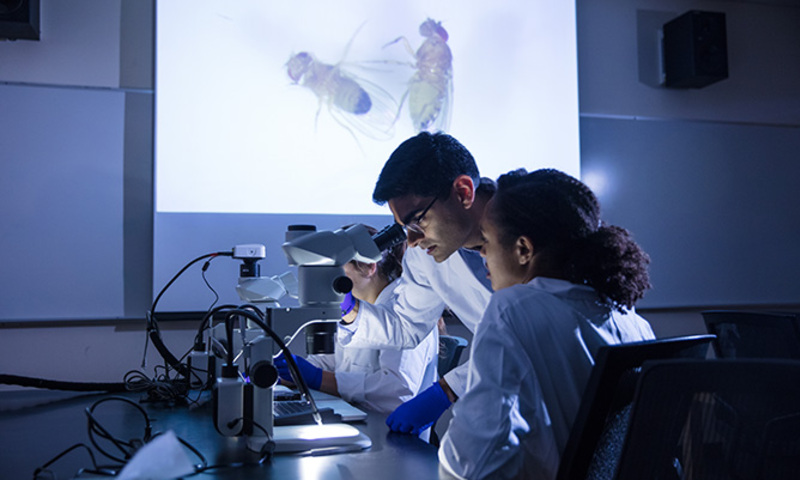An abundance of career options exist that offer invigorating experiences for those studying Biological Sciences who are willing to dive in and put their passion to work. From examining ocean depths as a research scientist or marine biologist to running a wildlife rehabilitation center, undergraduate degree holders have access to limitless possibilities within the field of biological sciences.
Below, we cover seven dynamic jobs you can pursue with a degree in Biological Sciences, including salary range information and career prospects over the coming years. Individuals who possess an undergraduate degree may pursue any of these career paths; however, a master's degree or doctoral degree, further education such as medical school, or advanced experience can be required to rise to more advanced positions.
A larger, more exhaustive list of potential careers is provided below.. The varied career options discussed will allow you to use your biology degree in innovative and consequential purposes, while also being able to pay the bills.
7 Jobs for a Biology Major
Conservation Scientist
Wildlife Rehabilitator
Aquatic Ecologist
Marine Biologist
Pharmaceutical Researcher
Microbiologist
Environmental Educator
1. Conservation Scientist
Salary (Est.): $74,542 per year (source: glassdoor.com)
What does a Conservation Scientist Do?
A conservation scientist is an expert in the field of biology who focuses on studying and protecting natural environments, ecosystems and species. They use their knowledge to develop plans and policies that seek to protect, restore and manage the land, water and other resources in a sustainable manner. Conservation scientists are employed by all types of U.S. entities including government agencies, nonprofit organizations and private companies such as the EPA, Burns & McDonell and more.
Career Prospects
Due to the growing urgency for environmental protection, conservation and management, a career as a conservation scientist is an excellent option for biology graduates. The demand has steadily risen over recent years, and promises plenty of exciting opportunities in the future. Additionally, those who specialize in a particular field, such as forestry or wildlife management, can find employment opportunities with private companies and organizations that are concerned with the sustainability of natural resources. conservation scientists play an important role in protecting the environment and helping to ensure that generations to come will be able to experience and enjoy its beauty.
Fun fact
Depending on the job role, a conservation scientist may be asked to work undercover to investigate poaching.
2. Wildlife Rehabilitator
Salary (Est.): $45,391 per year (source: glassdoor.com)
What does a Wildlife Rehabilitator Do?
A wildlife rehabilitator is an individual who is responsible for providing medical care and a safe home to sick, injured or orphaned wild animals. They provide assistance to a wide range of animals, from birds to mammals, reptiles and amphibians. Rehabilitators often work in collaboration with veterinarians, wildlife biologists and other animal care professionals in order to develop the best course of treatment for every animal. In addition to providing medical care, they also provide habitats for wildlife in need and educate the public about wildlife conservation efforts.
Career Prospects
The need for wildlife rehabilitators is expected to increase in the coming years, driving solid project demand for those working in the field. Rehabilitators who specialize in a particular species, such as birds or mammals, may be able to find employment with private organizations and businesses that are dedicated to conservation efforts.
In addition, many states have wildlife rehabilitation centers, where individuals can work alongside veterinarians and other animal care professionals. Wildlife rehabilitators play an important role in helping to protect the environment and providing a safe home for injured wildlife. With their knowledge and dedication, they can help to ensure the continued health of our planet’s wildlife.
Fun Fact
Wild boars are among the most dangerous animals to rehabilitate.
3. Aquatic Ecologist
Salary (Est.): $91,318 per year (source: glassdoor.com)
What does an Aquatic Ecologist Do?
An aquatic ecologist uses their understanding of biology to study lakes, rivers and other bodies of water. You could be researching the effects of pollutants on aquatic life or looking for ways to restore damaged ecosystems. You may also use your skills to help manage and protect freshwater sources.
Career Prospects
Similar to many positions discussed above, the future is bright for aquatic ecologists as the need to protect and preserve our environment continues to rise. Employment opportunities abound in this field — from governmental agencies and private companies, to research institutions and nonprofit organizations. As aquatic ecologists, these professionals play a pivotal role in safeguarding nature’s delicate balance by utilizing their specialist skillset.
These professionals may also be involved in education, providing guidance on the importance of conserving the environment to students and other members of the public. By educating the community, they are helping to ensure that future generations are aware of the importance of protecting our environment. With their knowledge and dedication, aquatic ecologists can play a key role in preserving our planet’s natural resources.
Fun Fact
The world's first aquatic ecologist was German-born scientist Johann Heinrich von Thünen (1783–1850).
4. Marine Biologist
Salary (Est.): $59,186 per year (source: glassdoor.com)
What Does a Marine Biologist Do?
A marine biologist is a scientist with specialized knowledge in the field of biology related to aquatic life. From fish, dolphins and whales to coral reefs and ocean floors, these experts explore all aspects of our world's waters. They may find employment at universities, research centers or aquariums — giving us greater insight into what lies beneath the surface!
Career Prospects
As an aspiring marine biologist, you will have access to a host of career opportunities due in part to the growing focus on ocean health and environmental conservation initiatives. Universities, laboratories, aquariums, wildlife refuges and national parks are among the many public organizations that offer employment for those with a bachelor's degree in marine biology who wish to make a contribution toward preserving our aquatic ecosystems and protecting endangered species. Additionally, you may also find jobs with private industries such as oil companies and pharmaceutical companies that conduct ocean-related research projects or have an interest in understanding how their operations impact aquatic life.
Fun Fact
George Costanza pretended to be a marine biologist in the hit television show Seinfeld.
5. Pharmaceutical Researcher
Salary (Est.): $149,422 per year (source: glassdoor.com)
What does a Pharmaceutical Researcher Do?
If you’re interested in developing medications that can save lives and improve human health outcomes, consider a job in pharmaceutical research. You’ll use your knowledge of biology to develop new drugs and test the safety and efficacy of existing medications. These health service professionals are an important part of modern medicine.
Career Prospects
The outlook for pharmaceutical researchers is positive due to the increasing demand for new and improved treatments. Professionals with knowledge in this field will be able to find work with pharmaceutical companies, research institutions, medical centers and universities. Pharmaceutical researchers play an important role in improving public health and developing treatments that can help save lives. With their expertise they can help ensure that medications are safe, effective and accessible to those who need them.
These professionals may also be involved in education, providing guidance on the latest developments in the field to students and other members of the public. By educating the community, they are helping to ensure that future generations are aware of how science is being used to improve healthcare. With their knowledge and dedication, pharmaceutical researchers can play a key role in improving public health outcomes.
Fun Fact
The biopharmaceutical research industry employed nearly 200,000 people in the U.S. in 2018 according to the Pharmaceutical Research and Manufacturers of America (PhRMA).
6. Microbiologist
Salary (Est.): $79,260 per year (source: Bureau of Labor Statistics)
What does a Microbiologist Do?
Microbiologists use their knowledge of life sciences and biology in particular to study microorganisms, such as bacteria and viruses. You could be researching diseases, developing vaccines, or working on ways to improve food safety among many other expanding career options.
Microbiologist Career Prospects
The outlook for microbiologists is very positive, with an expected job growth rate of 9% from 2021 to 2031, which is faster than the average growth of all jobs according to bls.gov. Professionals with knowledge in this field will be able to find work with governmental agencies, research institutions, medical centers and universities.
These professionals may also be involved in education, providing guidance on the latest developments in the field to students and other members of the public. By educating the community, they are helping to ensure that future generations are aware of how science is being used to improve healthcare. With their knowledge and dedication, microbiologists can play a key role in improving public health outcomes.
Fun Fact
Microbiologists have identified thousands of different species of bacteria living on and inside the human body, many of which are essential for maintaining good health.
7. Environmental Educator
Salary (Est): $83,040 (source: Bureau of Labor Statistics)
If you want to share your love of biology and environmental science with others, consider becoming an environmental educator! You’ll have a chance to inspire students about the natural world around them and teach them how their actions can make a difference in caring for our planet.
Environmental Educator Career Prospects
If you're interested in helping others comprehend their effect on the environment, there has never been a better time to pursue environmental education. With an ever-increasing demand for professionals in this field, opportunities are readily available at museums, nature centers and parks as well as universities and other educational facilities.
Environmental educators play an important role in teaching people about the importance of conservation and stewardship. With their expertise they can help ensure that people have the tools to make informed decisions about environmental management, sustainability and more. These professionals may also be involved in research, providing guidance on the latest developments in the field to students and other members of the public. By educating the community, they are helping to ensure that future generations are aware of how science is being used to protect the environment. Environmental educators can also play a key role in improving public health.
Fun Fact
Environmental educators are using Artificial Intelligence (AI) to analyze data from remote sensors and drones to track environmental changes and use machine learning algorithms to identify new solutions to existing environmental issues.
If none of the careers above sound like a good fit, consider the biology careers and jobs below:
Biochemist
Molecular Biologist
Zoologist
Geneticist
Scientific Writer
Botanist
Population Ecologist
Fisheries Scientist
Physiologist
Microbial Ecologist
Veterinary Technician/Assistant
Pathology Lab Technician
Clinical Research Associate
Forensic Scientist
Food Technologist
Aquaculture Manager
Environmental Toxicologist
Pharmaceutical Sales Representative
Animal Caretaker
Soil Scientist
Heritage Conservation Officer
DNA Analyst
Pharmacist
Medical Laboratory Technician
Petroleum Geoscientist
Biological Technicians
Research Scientists
 Biola University
Biola University



.jpg)